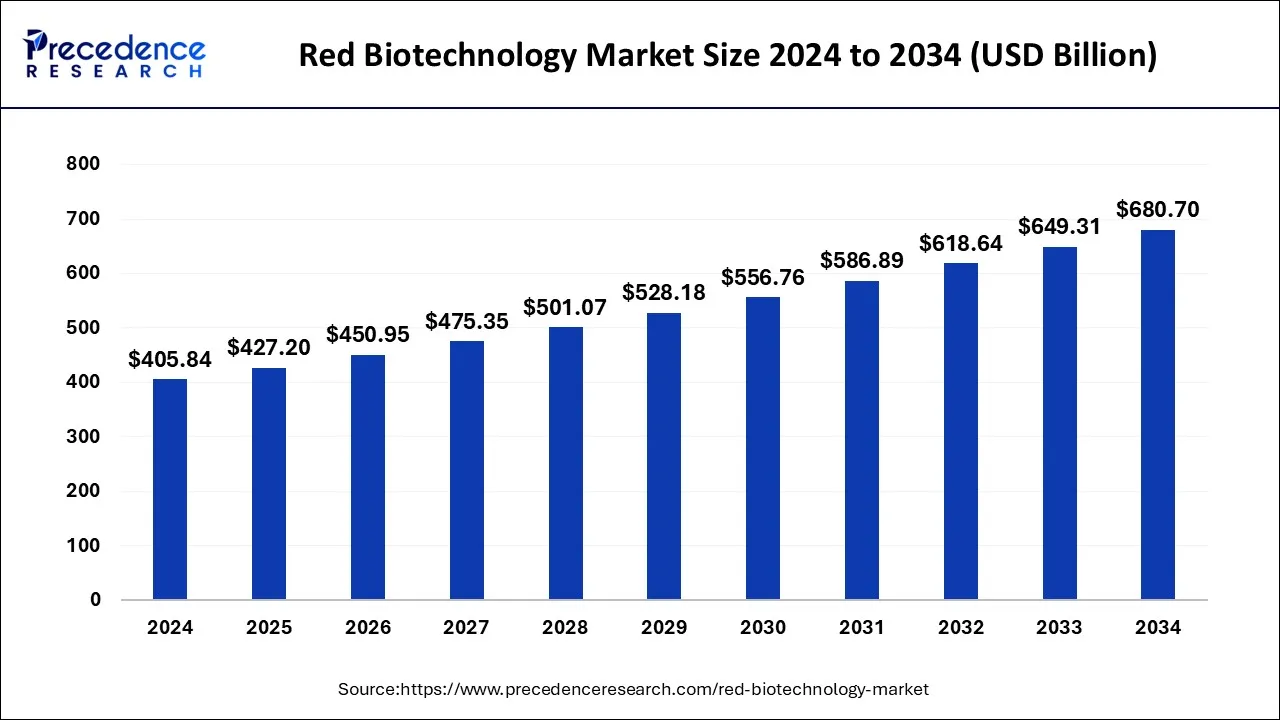The Global Red Biotechnology Market is projected to reach USD 649.31 billion by 2033, up from USD 385.01 billion in 2023, growing at a CAGR of 5.36% from 2023 to 2032.
Critical Observations
- North America held the largest market share of over 38.17% in 2023.
- Monoclonal antibodies dominated the product segment by revenue in 2023.
- Pharmaceutical and biotechnology companies contributed 46% of the revenue share in 2023.
- The CMO & CRO segment is forecasted to expand at a CAGR of 12.9% from 2024 to 2033.

This biotechnology market has gained immense speed through advancements in medical therapies, diagnostics, and treatments. It works upon developing healthcare product-based ideas dealing with problems associated with health like genetic disorder, cancer, or infectious disease, etc. These innovative breakthroughs in products will include technologies that deal with the applications of monoclonal antibodies, gene therapy, or personalized medicines. As investment increases within these pharmaceutical and biotechnology industries, so will this market. With continuous technological advancements, the red biotechnology market is expected to expand significantly, offering new opportunities for improved patient outcomes.
Sample Link: https://www.precedenceresearch.com/sample/1010
Market Scope
| Report Highlights | Details |
| Market Size in 2023 | USD 385.01 Billion |
| Market Size by 2033 | USD 649.31 Billion |
| Growth Rate from 2024 to 2033 | CAGR of 5.36% |
| Largest Market | North America |
| Fastest Growing Market | Asia Pacific |
| Base Year | 2023 |
| Forecast Period | 2024 to 2033 |
| Segments Covered | Product Type, Application, End User, Region |
Core Factors
Potentials
- The red biotechnology market is growing significantly, driven by advancements in gene therapy, regenerative medicine, and biologics.
- In 2023, the market was valued at USD 385.01 billion and is projected to reach USD 649.31 billion by 2033, growing at a CAGR of 5.36%.
- North America held the largest market share of over 38% in 2023, with the U.S. expected to grow at a CAGR of 5.37% by 2033.
- Europe is experiencing substantial growth due to rising research activities and healthcare infrastructure expansion.
- Asia Pacific is set to offer lucrative opportunities, fueled by product approvals, rising CMO and CRO activity, and biopharmaceutical investments.
- The biopharmaceutical industry is anticipated to dominate the market, with increasing demand for biologics and clinical trials.
Obstacles
- High R&D Costs: The significant investment required for research and development of red biotechnology products can strain resources, especially for small and medium-sized companies.
- Regulatory Hurdles: Stringent and complex regulatory approvals for clinical trials and product commercialization can delay market entry and increase costs.
- Ethical Concerns: Issues around gene editing, stem cell research, and the use of human tissues for research often face ethical scrutiny, potentially limiting market growth.
- Long Development Timelines: The time required to develop red biotechnology products, from research to approval, can be lengthy, delaying returns on investment.
- Market Competition: Increasing competition from generic products and biosimilars can hinder the growth of new and innovative treatments.
- Supply Chain Challenges: Ensuring a stable supply of raw materials and maintaining quality standards for biologics can be challenging, especially in emerging markets.
Regional Insights
The red market of biotechnology market diverges at the regional level. North America is the leader, due to a sound healthcare structure, active investment in R&D, and favorable regulatory policies, particularly in the U.S. European market is growing due to government support for biotechnology innovation and the presence of pharmaceutical giants in countries such as Germany and UK. Asia-Pacific, especially China and India, is becoming a major player due to increased investments in biotech research, lower manufacturing costs, and expanding healthcare sectors. Latin America and the Middle East are emerging markets, with potential for growth as governments accelerate healthcare initiatives and biotechnology research, though there are challenges in the form of regulatory hurdles and limited infrastructure.
Don’t Miss Out: Recycled Polyethylene Terephthalate Market
Industry Leaders
- Hoffmann-La Roche, Ltd.
- Merck KGaA
- Regeneron Pharmaceuticals, Inc.
- Pfizer, Inc.
- Biogen Inc.
- Amgen Inc.
Recent Insights
Market Segmentation
By Product Type
- Monoclonal Antibodies
- Polyclonal Antibodies
- Recombinant
- Proteins Vaccines
- Cell-Based Immunotherapy Products
- Gene Therapy Products
- Cell Therapy Products
- Tissue-Engineered Products
- Stem Cells
- Cell Culture
- Viral Vector
- Enzymes
- Kits and Reagents
- Animal models
- Molecular diagnostics
- Others
By Application
- Pharmacogenomics
- Biopharmaceutical Production
- Gene Therapy
- Genetic Testing
By End-user
- Research Institutes
- CMOs & CROs
- Biopharmaceutical Industries
- Others
Ready for more? Dive into the full experience on our website!
